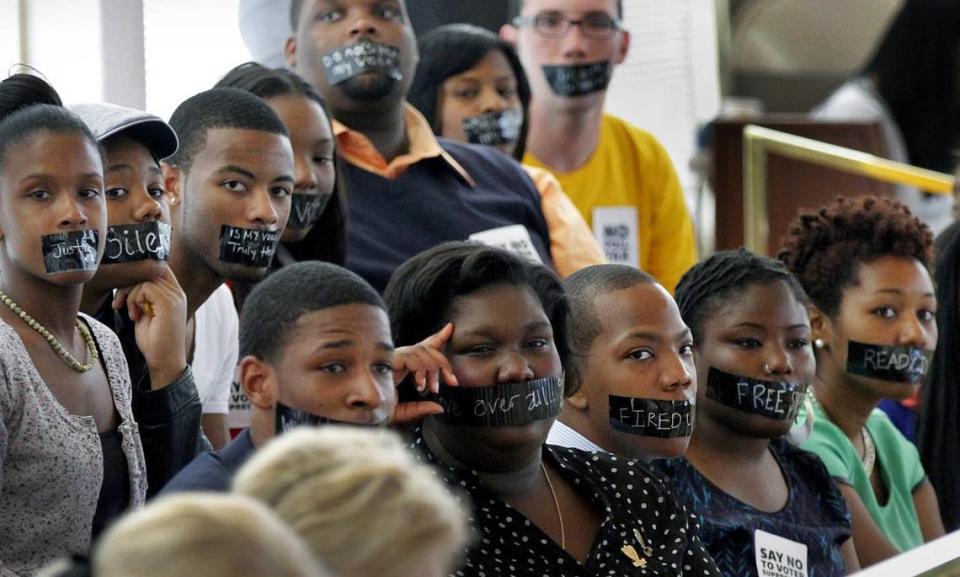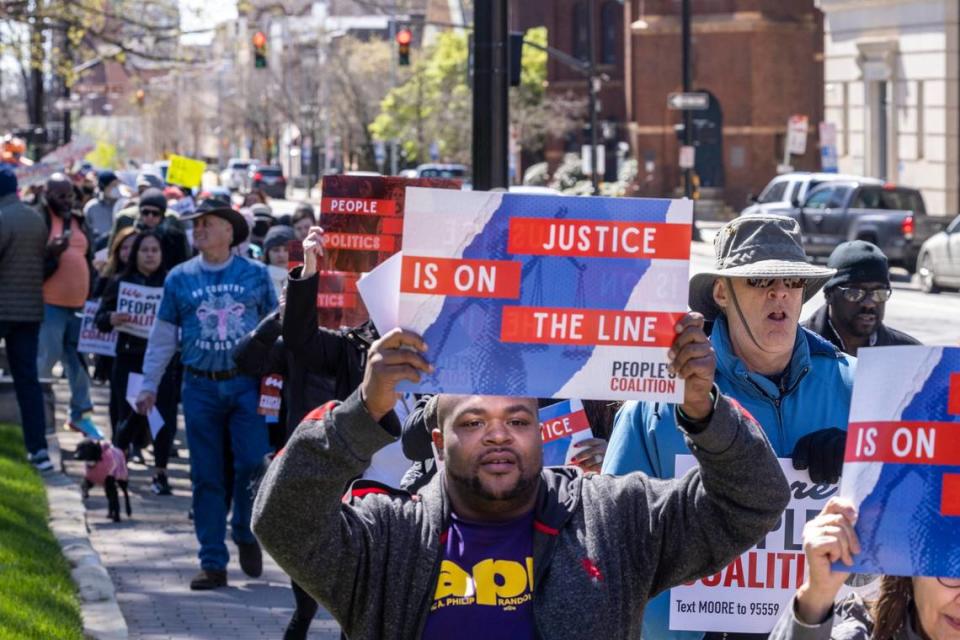Under the Dome Updates: Medicaid expansion clears Senate, voter ID ruling reconsidered
This week’s busy schedule in state politics continues Wednesday, with another important voting rights and elections case being reheard at the N.C. Supreme Court, and the governor unveiling his budget proposal.
The House and Senate will also vote on several bills this afternoon, including Medicaid expansion, which is expected to get final approval in the Senate before it can return to the House for a concurrence vote.
Refresh this page to follow the day’s latest updates, and find more coverage on our website and Twitter account.
5 p.m.: Medicaid expansion passes Senate
State senators backed a deal reached by Republicans on Medicaid expansion with bipartisan support, passing the bill on a 44-2 vote.
House Bill 76 passed the Senate in less than five minutes with no debate and no amendments.
It now returns to the state House for an up-or-down “concurrence” vote. That would send it to Gov. Roy Cooper, who has championed Medicaid expansion.
3:30 p.m.: Justices hear new arguments in voter ID case
Attorneys representing the Republican-controlled legislature and plaintiffs who challenged the state’s voter ID law enacted in 2018 re-argued the case at the North Carolina Supreme Court on Wednesday.
The new round of arguments, over the law’s constitutionality and previous rulings that prevented it from being enforced due to findings that it was racially discriminatory, came after the Republican majority on the Supreme Court agreed last month to rehear the case.
Voting rights groups and other plaintiffs have accused the Supreme Court of playing politics by agreeing to reconsider its previous ruling once the court’s composition had changed. Republicans say it was the court’s outgoing Democratic majority making a political choice when it issued its ruling along party lines in December, just weeks before the newly elected GOP majority would be seated.
Peter Patterson, an attorney for the legislature, said that a trial court ruling that struck down the voter ID law was “unsound legally and factually,” and argued that no evidence presented to the courts had showed a racially discriminatory intent on the part of lawmakers.
During a back-and-forth with Justice Anita Earls, one of the two Democrats on the bench, and the author of the December ruling upholding the trial court ruling, Patterson addressed the question of why it was necessary for the court to rehear the case.
“So, help me understand when any case would be final,” Earls said. “Because in every case, there are two sides to the argument, and the side that loses believes that we misapprehended the law and got it wrong. So, where do we draw the line? When do we not allow rehearing, if one side says we got it wrong, (and) that’s sufficient to have rehearing and reverse our decision. How does that give us any finality in the law?”
“It’s when a majority of this court, considering the arguments that something was misapprehended or overlooked, decides that, ‘No, we do not agree with that,’” Patterson replied.

Patterson also disputed the notion that Republicans enacted the voter ID law to entrench themselves in power by noting that a handful of Democrats voted for the bill in question, Senate Bill 824.
“No one has ever explained how that is consistent with the plaintiffs’ theory of the case,” Patterson said. “The trial court did not, the plaintiffs have not in their briefs, this court in its initial decision did not.”
Paul Brachman, an attorney for the plaintiffs, said the December ruling in the case was correctly decided and should be left in place.
Republican justices asked Brachman if there was any “direct evidence” that GOP lawmakers intended to discriminate against African Americans.
Brachman said no statements made by lawmakers during the debate over SB 824 clearly stated that the purpose of the bill was to discriminate against certain voters, but said courts can still conclude that a law was written with discriminatory intent.
“There’s nothing improper about that, precisely because we hope, in 2023, that we are well past the point where legislators are going to stand up on the floor of the General Assembly and proclaim an intent to disenfranchise African American voters,” Brachman said.
12 p.m.: Gun rights package headed to House floor
With a vote Wednesday morning, a package of gun rights legislation that includes the controversial repeal of the state’s permit requirement to buy handguns cleared the final hurdle in the House before a floor vote.
Senate Bill 41, which passed the upper chamber last month in a purely party line vote, includes three proposals:
▪ A repeal of the pistol permit law.
▪ An expansion of concealed carry to churches that also operate as schools or have attached schools, which supporters say will ensure congregants can keep themselves safe during services that are taking place when schools aren’t in session.
▪ A two-year statewide awareness initiative promoting safe gun storage.
The bill cleared the House Rules Committee with no debate by lawmakers, and could receive a vote on the floor as early as Wednesday afternoon.
12 p.m.: Supreme Court to rehear voter ID case
The North Carolina Supreme Court will rehear the second of two important elections cases on Wednesday.
At 12:45 p.m., the justices will hear a new round of arguments in Holmes v. Moore, the case in which the court’s previous Democratic majority found in December that the state’s 2018 voter ID law was unconstitutional because it targeted Black voters with racially motivated rules.
Republican lawmakers have been trying to require photo identification to vote since they gained control of the General Assembly more than a decade ago, but have repeatedly run into legal obstacles in federal and state court.
The voter ID ruling is one of two contentious rulings decided along party lines in December that the court’s recently seated Republican majority has sought to reconsider.
Last month, the court voted similarly along party lines to rehear Harper v. Hall, a case involving political maps GOP lawmakers drew and later redrew after a legal challenge.
The court’s outgoing Democratic majority ruled in December that maps excessively gerrymandered along partisan lines ran afoul of the state constitution, but during a new round of arguments in the case Tuesday, Republican justices seemed poised to issue a dramatically different ruling.


